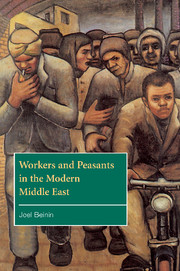Book contents
- Frontmatter
- Contents
- List of tables
- Acknowledgments
- Glossary
- List of acronyms and abbreviations
- Map 1: The Ottoman Empire, 1699–1914
- Map 2: Egypt and Bilad al-Sham
- Map 3: The Middle East in the twentieth century
- Introduction
- 1 The world capitalist market, provincial regimes, and local producers, 1750–1839
- 2 Ottoman reform and European imperialism, 1839–1907
- 3 The rise of mass politics, 1908–1939
- 4 Fikri al-Khuli's journey to al-Mahalla al-Kubra
- 5 Populist nationalism, state-led development, and authoritarian regimes, 1939–1973
- 6 Post-populist reformation of the working class and peasantry
- Notes
- References
- Index
5 - Populist nationalism, state-led development, and authoritarian regimes, 1939–1973
Published online by Cambridge University Press: 03 February 2010
- Frontmatter
- Contents
- List of tables
- Acknowledgments
- Glossary
- List of acronyms and abbreviations
- Map 1: The Ottoman Empire, 1699–1914
- Map 2: Egypt and Bilad al-Sham
- Map 3: The Middle East in the twentieth century
- Introduction
- 1 The world capitalist market, provincial regimes, and local producers, 1750–1839
- 2 Ottoman reform and European imperialism, 1839–1907
- 3 The rise of mass politics, 1908–1939
- 4 Fikri al-Khuli's journey to al-Mahalla al-Kubra
- 5 Populist nationalism, state-led development, and authoritarian regimes, 1939–1973
- 6 Post-populist reformation of the working class and peasantry
- Notes
- References
- Index
Summary
Until the mid-1930s the majority of the political classes of the Middle East espoused liberal projects of cultural and social reform and political and economic development that they expected would set their countries on what they understood to be the historical trajectory of France and England (Hourani 1962). These projects recruited peasants and workers to send their children to schools where they would learn to be productive citizens of secular nation-states, to work to build the national economy, and to participate in national political life on terms determined by their social betters. Higher wages, access to agricultural land, and other social issues were to be postponed in the name of the national cause. Liberal economics, politics, and culture were undermined by the depression of 1929–39, the impoverishment of the peasantry, the social demands of expanding urban working classes, the growth of an underemployed, young intelligentsia, the challenges of communism, fascism, pan-Arab nationalism, and Islamism, and the glaring discrepancies between liberal theory and Anglo-French imperial practice.
The Palestinian Arab Revolt of 1936–39 exemplifies the transition between political and social movements of the liberal era and the subsequent period. Palestinian notables did not initiate the revolt; they tried, but failed, to contain it; and their failure sparked a peasant-based struggle that challenged Zionism, British imperialism, and their own social and political dominance. The 1939 White Paper limited Jewish immigration and land purchases and attempted to accommodate Palestinian Arab demands without abandoning British rule or the principle of establishing a Jewish national home.
- Type
- Chapter
- Information
- Workers and Peasants in the Modern Middle East , pp. 114 - 141Publisher: Cambridge University PressPrint publication year: 2001
- 1
- Cited by



